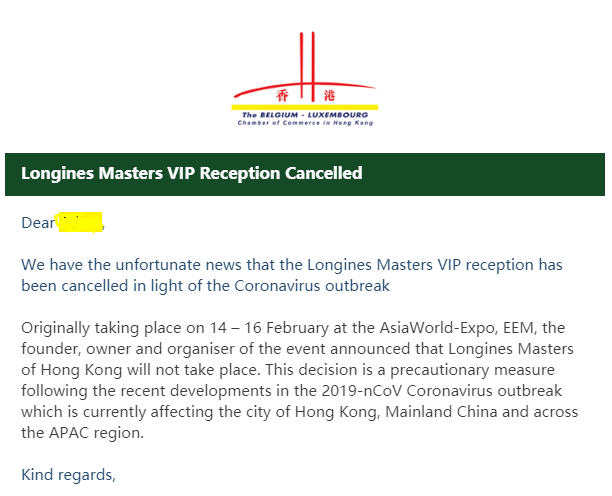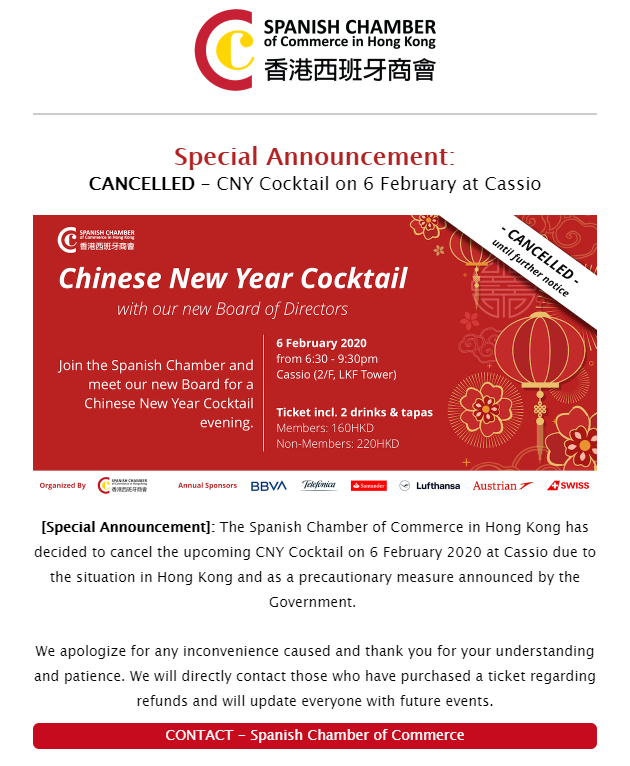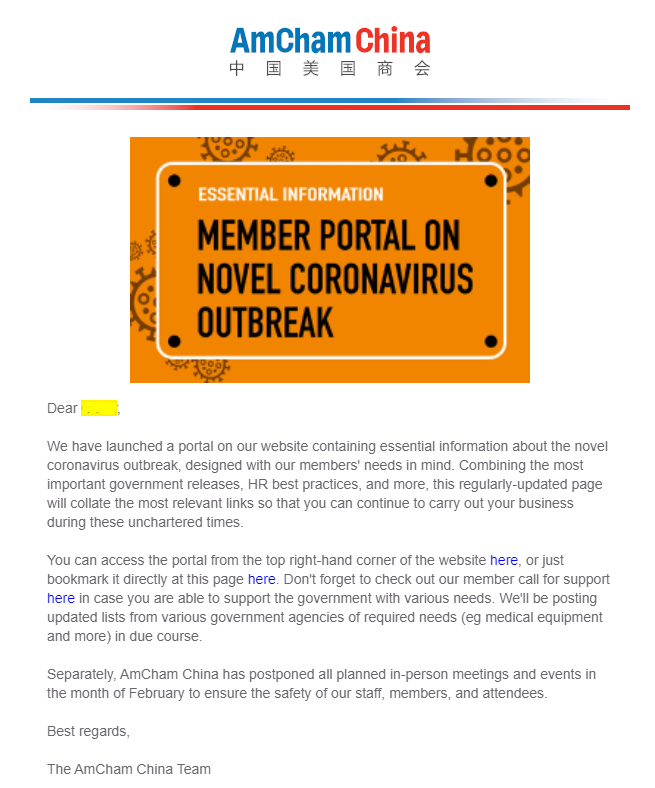
With the rapidly concerning coronavirus or, COVID 19, threat looming over the globe, it’s important for organizations to communicate, cancel, re-evaluate events, expectations and activities for members and attendees alike. With professionals working at home to stymie the spread of the virus, it is fast-become known as the world’s biggest work-from-home experiment, and this directly affects organizations and events.
Cancelling or postponing an event, especially when it happens because of reasons out of your control, is one of the most headache-inducing problems you can possibly face. More than the headache, you just feel embarrassed.
With Glue Up's offices around the globe, we've been dealing with the virus outbreak since it's first coverage in media, and we'd like to share some early on communication and strategies used by some of our clients using Glue Up to take their events and engagement digital as they adjust for webinars and video conferences in place of their planned physical events. We hope it can help your organization understand the importance of digital communication during this outbreak.
The Importance of Communication

Communication is the number one priority action needed to dispel disappointment, inform members and contacts of news and upcoming changes, and offer alternatives to anything that’s been impacted. A member may refute renewal of their membership, or refuse to attend events in times of emergency when in fact you may be offering alternatives or reassurance, leaving more control of the situation in your hands, all while keeping your audience safe.
As a case study, Glue Up handles clients across the world, and crisis like coronavirus have made an impact on these organizations in where events and other activities needed to be postponed or cancelled as it was no longer advisable to have larger gatherings of people in order to stem the spread of the virus.
In an attempt to lessen the impact this crisis had organizations made efforts to deliver pertinent information to members and contacts with notifications of cancelled events, and then provided alternatives to these events, so that this would not affect their performance and value-provided services as severely.
In doing so, communication is the prime method of protecting attendees and members in any times of crisis. It also acts as a channel for proper delivery of alternatives like remote webinar events.
When communicating cancellations and news of crisis at your organization or event, remember to follow a few key rules that help to make it easy for your audience to engage online.
Step 1. Turn Off Any Ticketing Systems
Specifically for events, turn off ticketing immediately. Don’t let people register for an event that’s cancelled, fairly straight forward.
Step 2. Refund event tickets/discount members for their next renewal

For events, always refund tickets in full, and for organizations, it’s optional, but recommended that you offer discounts to current members who are close to renewing as a way to apologize for the lessening or lack of engagement and services provided during the situation.
Step 3. Offer Alternative Events/Services
Offer an alternative event that doesn’t put anyone at risk, like making an ideal event into an online webinar.
Step 4. Give a Time-frame and Point of Contact

Finally, give your audience a way to keep in the loop with what’s going on, maybe a schedule of news or events, as well as a point of contact for any and all questions concerning the situation.
When Should You Cancel or Postpone Events?
This is possibly the most crucial part before you start cancelling and postponing an event. If you can’t identify the right cue for cancellation and postponement, then you risk have a terrible event, which is a much worse situation than just having cancelled instead.
Let’s identify some of the biggest cues you can take from to identify when it might be time to cancel.
Internal Cues
Internal Cues are hints from your end of the event bargain that can implicate a failed event in the horizon. These are not cues your attendees can easily understand, but at the same time you’re typically in control of some of them, and it’ll be up to your ability to manage these cues before they become a problem, but inevitably one day they very well may become such a big issue, it causes cancellation
Not enough attendees
This one is different for each event manager/team, as it' just depends on the goal of the event. There's a break-even point for events looking to make ROI off the ticket sales, and for event where ROI is not a goal but something less superfluous, may have a more ambiguous attendee break-even point.
For instance, if you’re running an ROI-centric event, and you need a certain amount of attendees purchasing tickets, then there’s a key number of attendees at which their purchases pay for the cost of the event. However for free events or events with other KPI’s than ROI in mind, then you’re likely going to have to work with a number that’s made up for one reason or another.
If you fall below that number, the even may not entirely be a bust for your attendees, but it might bust the bank.
If you would like to learn more about calculating Event ROI, read our post on it here.
Speakers drop out
This is less your fault in most cases, and it can be hard to avoid. This is when a key speaker at your event dropped out, and there’s absolutely no way the show can go on without them. Usually this is for Panel speaker MC’s, Keypoint Speaker, Hosts, and so on.
This is easily remedied by having more backup speakers than you might expect. However in some cases if the event is specifically about that speaker like a Book Signing, or Concert, then yeah, definitely might want to cancel or postpone.
Venue Cancels
This one is also a bit out of your hands as well, like speakers dropping out, there’s little control you have over the venue pulling out, though it’s rare they would do this last-minute, it can sometimes happen.
The good news is that usually this happens with a lot of prior notice and plenty of time to find a backup, but if your event hinges on the location, then this might be a cancellation point for you.
Understaffed
This cue is more in your hands than anything else and is entirely controllable (to a point). Staffing an event is obviously important to run the mundane tasks that keep things running smoothly. Depending on your event’s content, activities, and offerings, you’ll need staff to handle them. First and foremost is check-in and registration boothing, then just take it from there.
However if you find yourself with staff dropping out or no one taking the job, then you might want to consider postponing or cancelling if there’s no other help to be had.
Technical Issues
Technical issues can cause havoc, It’s entirely preventable in most cases, but without tech-wizards nearby when a crucial malfunction happens, you might be left in rock and a hard place. Lights may pop, speaks can break, projectors may just not work at all, or you simply brought the wrong equipment with ill-fitting plugs and sockets that don’t match the venue’s offerings.
It’s important to dry run all electronics before an event to make sure nothing major can hamper the success of the event, but alas, if there’s a city-wide power outage right before a movie premier, then you might want to consider hosting it another day.
External Cues
External Cues are simple, and more understandable for attendees to swallow when it happens. These are cues completely outside of your realm of control. These are things that not only affect your event, but your attendees lives as well. Let’s dig in.
Safety
Safety is your #1 priority. That means if weather is dangerous, bad driving conditions, or unsafe whatever that can affect your attendees from their front door to your event’s conclusion and that risk is undeniably larger than normal, it would be best advised to postpone or cancel the event.
Tragedy
Some events should be cancelled in lieu of local, national, or global tragedies in respect of the casualties and victims. This is extremely important as hosting an event in bad taste can mar your event or company’s reputation.
Travel Traffic
If traffic is going to be a problem in places where it’s hard to get around, or during periods of great migration like Chinese New Year in China, or the Hajj in the Middle East. This can even be as local as an Metro line closing for repairs or highways closed for accidents. If your attendees can’t attend, then rescheduling might be the more appropriate move.
Health
Health, like Safety, can be more optional than anything, but it’s in your best interests to keep your attendee’s best interests. If your attendees can get sick, have allergies, or otherwise suffer health problems by attending your event, then it’s high time your postpone and find a better way to host the event, or a venue with health in mind.
This is especially important during issues like outbreaks like the Coronavirus that’s been affecting events across Asia in 2020 where having large gatherings of people would pose health risks.
Social (Media) Consciousness
Social consciousness is not a tangible affect on your event’s success, but more of a collective set if ideals that if not listened to, can cause unforeseen consequences. This, like Tragedy Cues, are more or less the same, because you could be left hosting an event in bad-taste.
Putting together an event on the Holocaust during a Jewish holiday may sound like a thoughtful idea, but not listening to social cues from society and understanding early social consciousness on the issue, you might actually cause more harm than good. It’s best to avoid and cancel events that may rub your audience the wrong way.
Early listening may help nay major loss, or could even help to restore an event by using social media as your best friends. Social media conversations are a great way to gauge how your audience thinks, and give early clues at to your event’s reception when it’s ready to go public. Thankfully, social media has proven to be a phenomenal tool when it comes to social listening if you simply follow some of the biggest topics, hashtags and influencers relevant to you.
We hope this article has been helpful in delivering some insights into the importance of communication at your organization or next big event, if you'd like to discuss how your communication can be done smarter, more timely, and professional, contact us at Glue Up and we'll see how we can help you today.



